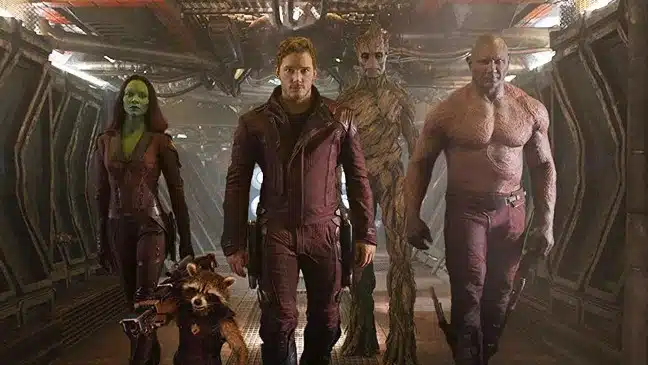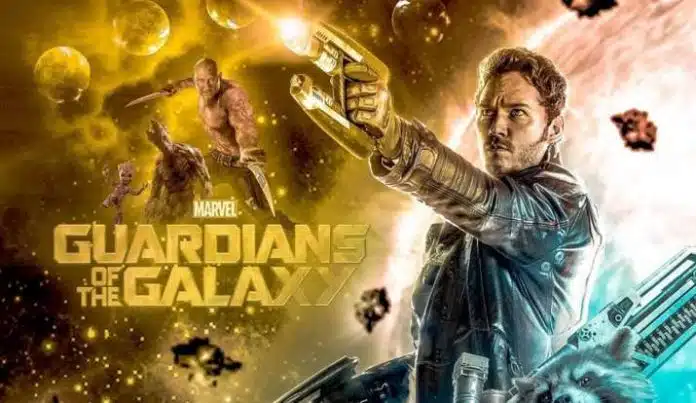The third film in the Guardians of the Galaxy franchise, directed by James Gunn, is full of breathtaking set pieces; but, the film’s syrupy efforts at romanticism and its formulaic story prevent it from ever taking off.
Chris Pratt has evolved into a gorgeous action lead, but Dave Bautista’s meaty Drax steals the show with his humor. We are sorry to announce that we were unable to locate any streaming options for Guardians of the Galaxy Vol. 3.
Chris Pratt, who plays the heartthrob action lead in Marvel’s Guardians of the Galaxy franchise, has been in the role for almost a decade, which is long enough for him to have fully matured into his heartthrob action-lead portrait and to have left behind the puppyish comics turn from TV’s Parks and Recreation series that got him hired in the first place. The franchise has now been running for almost a decade.
Rocket Racoon, whose voice is provided by Bradley Cooper, is shown at the beginning of “Vol. 3” listening to Radiohead’s “Creep.” In yet another movie that’s packed with astute needle drops, it serves as a tone-setter. Rocket thinks of himself as the freak and the creep, but the movie is going to convince him that he’s so freaking amazing that it’s ridiculous.
It all begins with a violent assault. Adam Warlock, played by Will Pouter and clad in golden armor, bursts into Know where at breakneck speed, destroying everything in his path with force. Rocket sustains the greatest damage during the film and is in critical condition for most of it.
This splits the narrative in two, with the first half focusing on Rocket’s past and the second half focusing on the Guardians’ attempts to rescue him in the present. The task takes them to the High Genetic, played by Chukwudi Iwuji, a crazy scientist who, many years ago, attempted to speed up the evolutionary process for a dystopia known as Counter-Earth by creating Rocket.
The Guardians, being human and all, have baggage, too. After Thanos killed Gamora (Zoe Saldana) and brought back an alternate timeline version of the character who doesn’t remember her time with the Guardian of the Glaxy, Peter (Chris Pratt) became emotionally unstable. Gamora participates in the Rocket mission, although her romance with Star-Lord isn’t the focal point of the tale as it was in the previous two films. Vol. 3 might have easily been about Peter and Gamora’s reunion, but instead it focuses on providing context for Rocket’s past, which allows for a new dynamic between Pratt and Saldaa. She shines here in her suspicious regard for the other Guardians, especially the one who professes to love an alternate her.
As for the rest of the gang, they’ve grown too numerous for a single film. It’s great to have Dave Bautista back in action, but Drax remains underutilized. Nebula, played by Karen Gillan, is another squad member who serves a purpose without receiving any character development. Even with the return of Pom Klementieff’s Mantis and the comedic contributions of Vin Diesel’s Groot, the film still seems too crowded to really enjoy. I didn’t even bring up Sylvester Stallone’s comeback or the fact that Elizabeth Debicki plays Adam’s creator Ayesha.
By being clumsy and offbeat, “Guardians of the Galaxy Vol. 3” most successfully subverts a “product beyond art” ethos. It’s counterintuitive to claim that many of today’s box office hits lack a gentle connection, yet many of them are.
Marvel Studios’ Guardians of the Galaxy Vol. 3 | Official Trailer
In contrast to the dull CGI that makes Marvel films appear like watching someone else play a video game, it’s exciting to see Gunn push through some of his really disturbing monster designs or locations that feel like they’re taking place in actual physical areas. There’s an even crazier, more introspective “Vol. 3” out there somewhere—the climax in particular seems like it’s checking off boxes on an MCU cheat sheet.
It’s in the seemingly little decisions that Gunn and the group who would obviously accompany him into combat have made up to this moment. Pratt has been phoned in some of his big-picture roles as of late, but he has always worked best on screen in the character of Peter Quill, both a hero and a buffoon in equal measure. Giving him a shattered heart enables Pratt to shake off some of the arrogant smugness that has held him back in prior films and rekindles our liking for Quill.
Saldaa is enjoying herself by going back to the fundamentals of a fighter like Gamora and attempting to persuade us that she could carry a movie like this on her own. But more than anything else, this is Rocket’s movie. It’s the tale of how he triumphs over adversity to become the hero he was always destined to be.
In spite of the fact that the antagonist isn’t very well developed—in fact, most of the characters are, simply because of how large the ensemble is—something intriguing happens here on a conceptual level that goes beyond the standard main character storyline. Without giving away too much of Rocket’s backstory, we can say that a turning point in his story occurred when he independently overcame a challenge posed by the High Evolutionary in one of his experiments. This caused the villain to descend into a pit of insecurity and a sociopath.
This might be seen as the narrative of a vindictive God, one who exacts retribution on his creation when it not only demonstrates its capacity for autonomy but also perhaps demonstrates a higher level of intelligence than its maker. However, Gunn manages to weave that idea through a Marvel vision with just the right amount of clever subtlety to give his film more depth than a lot of its competitors have managed to achieve. Gunn considers the possibility of a malevolent God, one who treats his works of creation more like scientific experiments than living individuals.
It is a narrative that suits Gunn well as he attempts to resist the Hollywood machine by bringing his vision to life. This is a story that fits Gunn wonderfully. He is the one who creates things, yet he wants his inventions to be more successful than he is.

The flashback and mission structure of “Vol. 3” may occasionally detract from the flow of the picture, and anybody who has seen a Marvel movie before is aware that the conclusion will include a lot of teamwork and explosives. And yet, even while the picture is crossing those things off the list, it does so while still maintaining Gunn’s individuality, whether it’s in his choice of music or in the dramatic images that can frighten younger audiences.
A significant portion of the current Marvel Cinematic Universe has had the feel of being slavishly trying to accomplish just enough to make a living. The film “Guardians of the Galaxy Vol. 3” serves as a reminder that the finest blockbusters don’t merely sing along to well-known music like “Creep;” rather, they make the song their own and give it a new meaning. After all, we are the oddballs in this group. And Gunn would argue that because of this, each and every one of us is quite exceptional in our own right as well.


